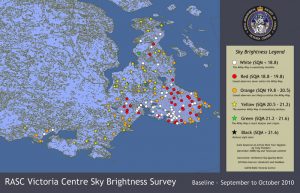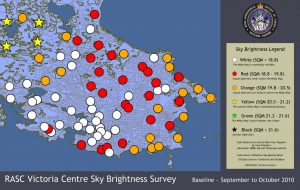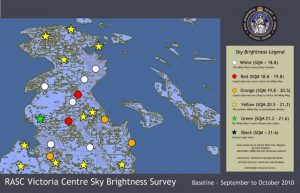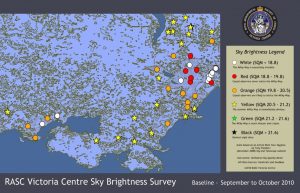Night Lighting
Light pollution
The effects of Light Pollution are felt locally and globally by all living beings on our planet. It does more than deprive us of our natural right to enjoy the night sky, waste energy, and degrade urban living. Light Pollution profoundly harms the natural environment in numerous ways, most significantly by universal disruption of Circadian Biology.
The Victoria Centre has joined a global initiative to reduce the adverse impacts of light pollution on human health and safety, wildlife, and the environment. Public education and participation are essential for success.
We invite you to review and share the information provided in the Resources below and hope that you will help reduce the light pollution in your neighborhood. Success will mean safer, healthier, greener, and more light efficient communities everywhere.
Please contact our Lighting Committee if you have questions, suggestions, or would like to help our efforts to bring back dark skies and protect our urban environment.
Visit: rasc.ca/outdoor-lighting
Resources
2019 Best Lighting (3.9Mb PDF)
Explanation of light’s importance
- Hidden Costs of Light Pollution Video – Light pollution can be a hazard to our health
- A Brief History of Chronobiology and Light (990kb PDF) – the study of biological rhythms and their adaptation to solar, lunar, and seasonal cycles
- Center for Circadian Biology – research centre on mechanisms, general principles, and applications of biological rhythms in diverse organisms
- Our Vanishing Night – A short, thought-provoking video describing the effects of light pollution
- Mario Motta interviewed by Sky & Telescope magazine – the medical effects of light pollution
Take action: How to choose the best lights when you need them
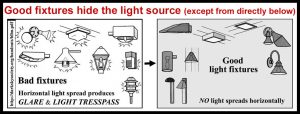
- Tips for outdoor lighting – Are you doing your part? pdf
- Lighting-guidelines
- Municipal Lighting Bylaws
- Urban Star Parks, Dark Sky Preserves, Nocturnal Preserves
- Light Pollution: The Dark Side of Outdoor Lights – a great resource from Del Mar Designs, a lighting company
More educational resources
- Light Pollution Cards – Set of 9 cards with pictures on front, text on back
- 7 Reasons Poster
- Summerland teen’s science fair project awarded for shedding light on crime – this well researched Science Fair project won a Summerland teen a gold medal at the National Competition: it shows high crime areas are well lit and has convinced him to walk on the dark side of the street.
Literature
Learn about the connection between light pollution and human health (cancer, sleep & mood disorders, obesity, diabetes, etc.); Wildlife health, declining Biodiversity, Ecosystem disruption; Air Pollution; wasted Energy; loss of the Night Sky, and more …
- Light Pollution Endangers Our Security and Our Safety
- 2014: Human alteration of natural light cycles: causes and ecological consequences
- 2018: The dark side of light: how artificial lighting is harming the natural world
- 2018: Make Light Healthier
- Light Pollution Harms the Environment
- The Problems of Light Pollution — Overview
- Our Strange, Important, Subconscious Light Detectors – Discover (2012)
- Plants use circadian rhythms to prepare for battle with insects Phys.Org (2012)
- Limiting the impact of light pollution on human health, environment & stellar visibility. J Environ Manage (2011)
- The Dark Side of Light – Ecology and Society (2010)
- Light Pollution – Human Health – American Medical Association (2009)
- Light Pollution boosts Air Pollution (2010)
- Missing the Dark: Health effects of light pollution – Environmental Health Perspectives (2009)
- Light Pollution – Biodiversity Threat – Trends in Ecology & Evolution (2010)
- Let there be night, for wildlife’s sake (2010) / Artificial Lights and Nature (2010)
- Environmental lighting and circadian disruption in cancer and other diseases – Environmental Health Perspectives (2007)
- Too Much Light at Night – Obesity – Science Daily (2010) / Obesity may shut down clock (2011)
- Circadian rhythms regulate metabolism (2012)
- Lighting for the Human Circadian Clock – a Public Health Issue – US National Institutes of Health (2004)
